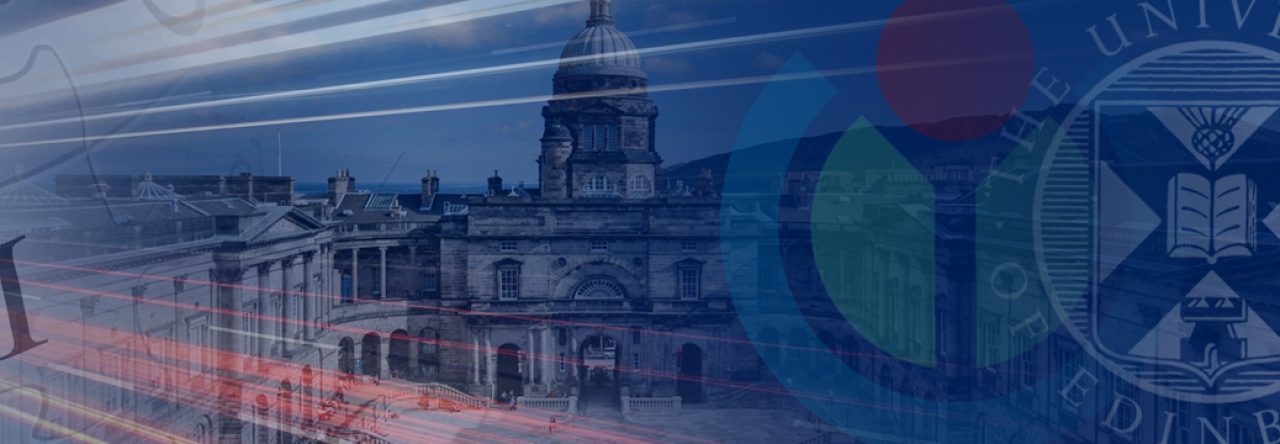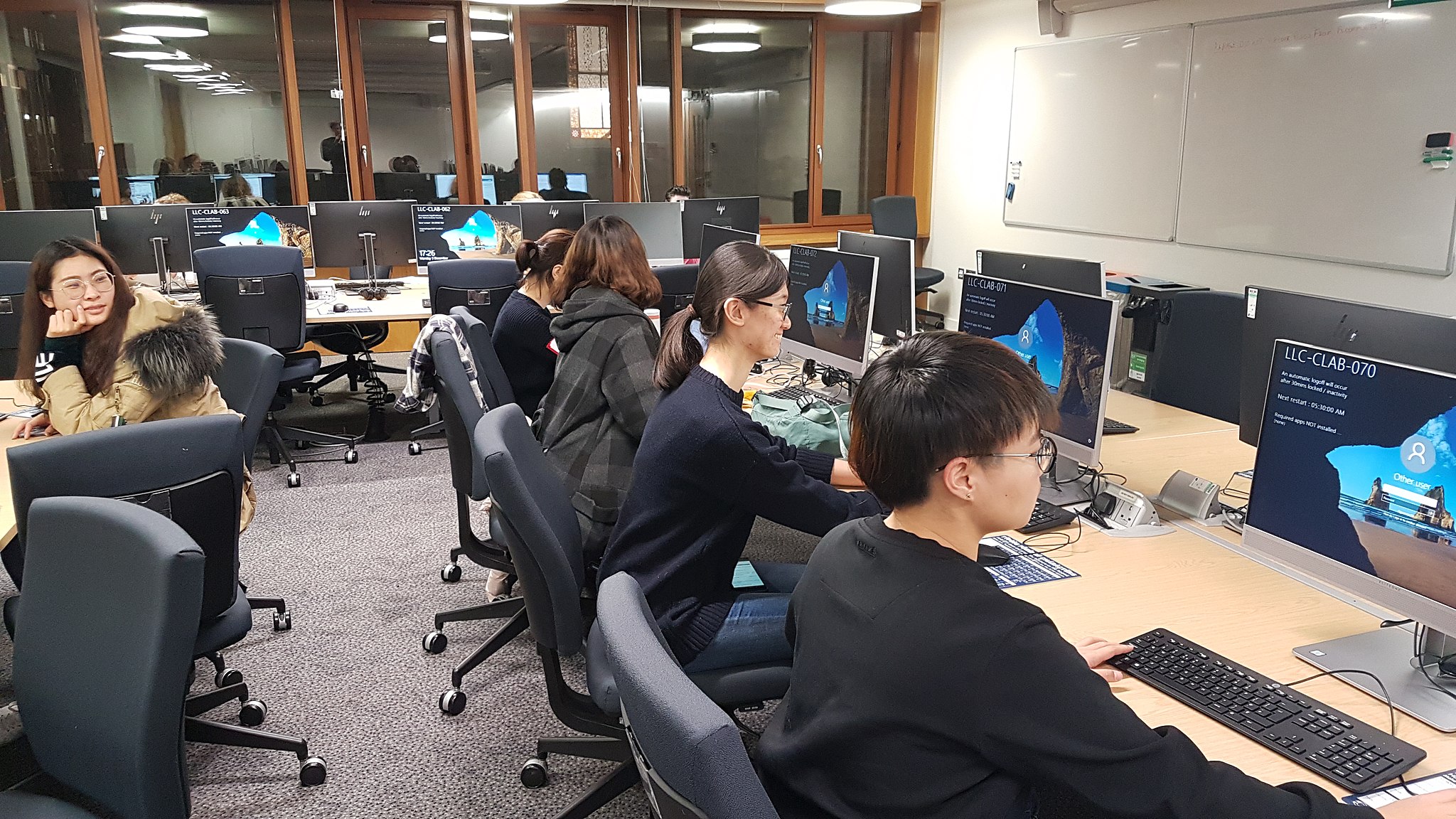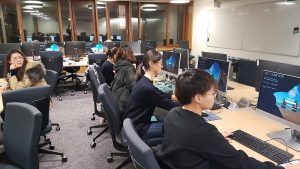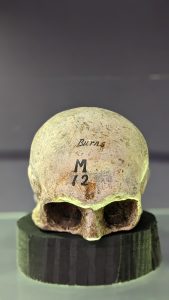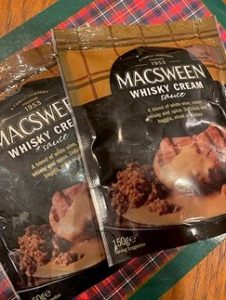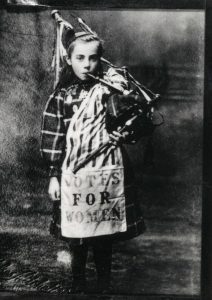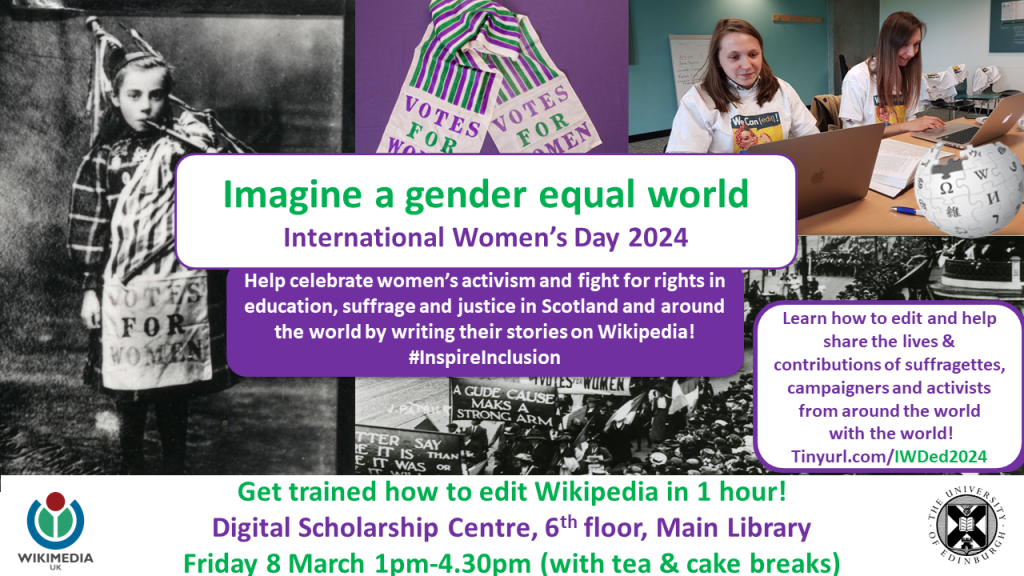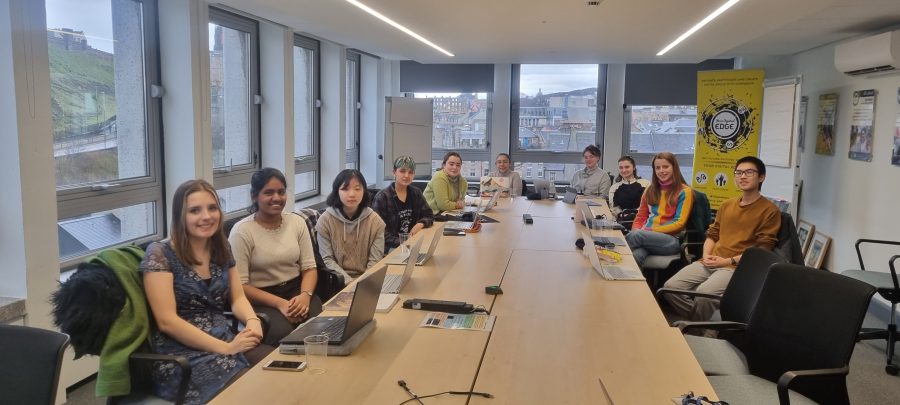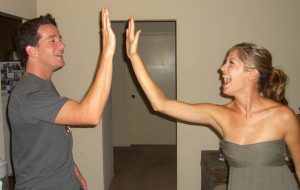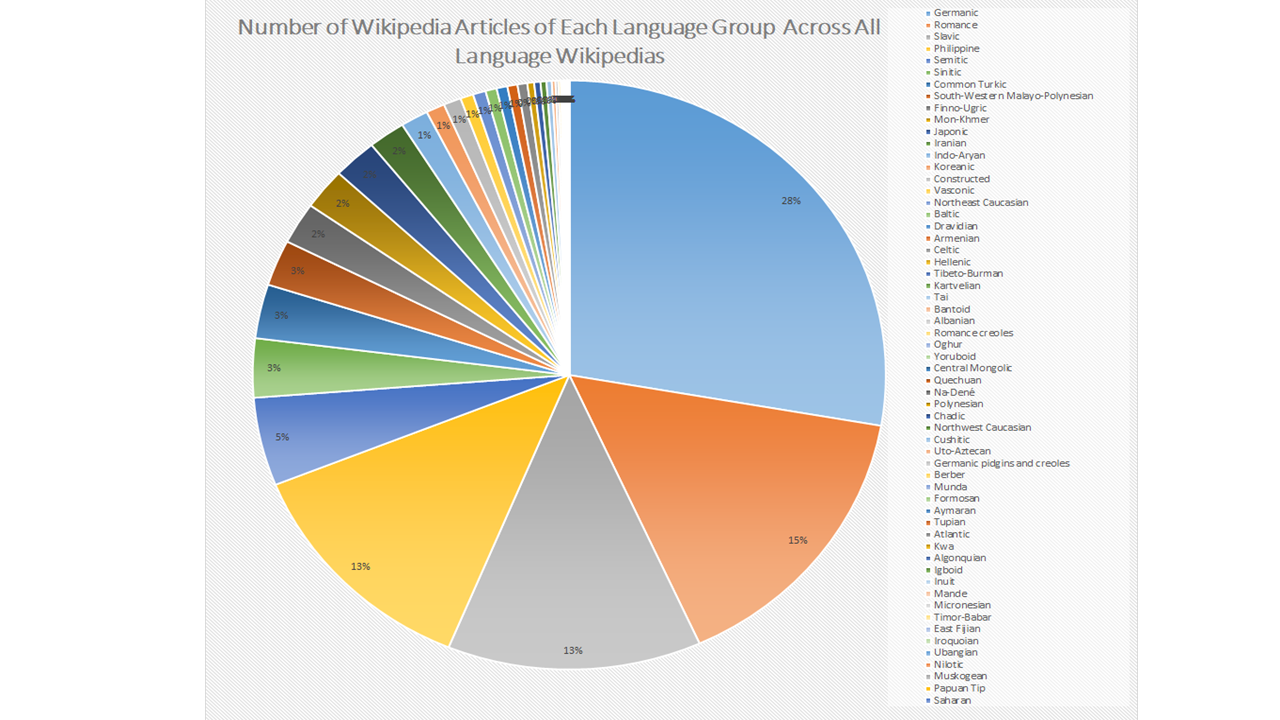This was a talk presented at the LILAC 2022 Information Literacy Conference held at Manchester Metropolitan University on 11-13 April 2022. The slides will be uploaded shortly.
0) Intro slide: Video of Manchester Metropolitan University’s Wikipedia page being edited.
Anyone can click “Edit” on any page on Wikipedia to improve its open-licensed information with verifiable facts. E.g. I’ve added a sentence to the page for Manchester Metropolitan University about it hosting the LILAC Information Literacy conference this year. Backed up with a citation.
Anyone can edit, yes, but you have to CITE WHAT YOU WRITE.
1) Welcome slide
Good afternoon everyone – welcome!
My name is Ewan McAndrew and I have worked since January 2016 at the University of Edinburgh as the Wikimedian in Residence.
I presented at LILAC in 2019 about our work supporting Wikipedia in the curriculum and you can read more about that work in our Booklet of Case Studies of Wikipedia in UK education at bit.ly/wikicasestudies
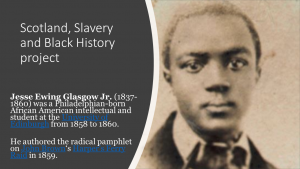
Jesse Ewing Glasgow
2) Scotland, Slavery and Black History slide
We’re actually updating that booklet to include 5 more case studies of work conducted during lockdown including our work with History Students to re-examine Scotland’s involvement in the transatlantic slave trade and a more positive examination of Black History including creating new articles about Jesse Ewing Glasgow and more.
3) History of Art UG course programme slide
Another new case study has been working with History of Art students to improve coverage of non-Western art in Wikipedia so that even if you don’t know about the visual culture of the Ummayads in Syria (of which we have a new article written by students) you will still encounter Islamic art on pages about inkwells, pitchers, bowls and more.
4) Wikipedia and Academic Libraries slide
Another great resource relevant to this audience is the new open access book on Wikipedia and Academic Libraries published last year and we’ve contributed a chapter focusing on the work of the last 5 years improving Wikipedia’s coverage about women in Scotland and changing the way stories are told.
5) Mentimeter slide
All that said, to warm you for my talk today, tell me via the power of Menti – what is your favourite Wikipedia article? Answers here.
6) News article slide
While we wait for your answers, here are some recent news article headlines I searched for in Google about Wikipedia.
7) Prospect Magazine quote slide
This last headline I like from Prospect magazine last month as it posited the question… “Who gets to define what’s true online?...
“In practical terms, truth is what Google’s knowledge graph … can deliver to its users.
Google’s knowledge graph is descended primarily from Wikipedia and Wikidata, an open-source collection of facts derived from Wikipedia, the remarkable participatory encyclopedia that, in the past 20 years, has become a core part of our collective knowledge infrastructure.”
Which reminded me of this earlier quote from Danah Boyd in 2017’s Did Media Literacy Backfire?
“Too many students I met were being told that Wikipedia was untrustworthy and were, instead, being encouraged to do research. As a result, the message that many had taken home was to turn to Google and use whatever came up first. They heard that Google was trustworthy and Wikipedia was not.”
8) 2nd Mentimeter question
Now 2nd question – if indeed “Search is the Way We Live now” then is Wikipedia part of the Information Literacy conversation at your workplace/institution? If so, how? If not, why not do you think?
9) Video slide
While you think about that I’ll show you this video to give you food for thought, with contributions from staff, students and Academic Support Librarians at the University of Edinburgh.
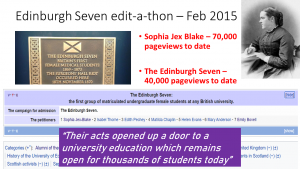
The Edinburgh Seven – our first editing event in Feb 2015
10) Edinburgh Seven slide
It’s now 7 years since our first experiment with Wikipedia, to improve topic coverage of the Edinburgh Seven on Wikipedia. The first female students matriculated at a British university when they fought for their right to study medicine at the University of Edinburgh.
The Edinburgh Seven now have their degrees, posthumously. And a blue plaque commemorating their fight for the right to study. We’ll never know how many stop to read that blue plaque but we do know how many are reading their Wikipedia page. Thousands.
11) Allison Littlejohn slide
This group editing event was evaluated by Professor Allison Littlejohn and referenced in her 2019 LILAC keynote – her research further cementing our belief that engaging with Wikipedia and in conversations over copyright, neutral point of view, open access, verifiability of sources, academic referencing, writing for a lay audience and issues of underrepresentation and invisibility online were absolutely pertinent in supporting the professional development of staff and students and helping us walk the walk when it comes to sharing knowledge outside of the Ivory Tower. Becoming knowledge activists.
12) WiR slide
Since 2016, the role of Wikimedian in Residence provides a free central service to all staff and students, working alongside other digital skills trainers, learning technologists and library colleagues and our OER Service to support the university to explore and better understand how knowledge is created, curated, and disseminated online. Beyond this, what they can get out of the learning and teaching experience from contributing to Wikipedia and understanding how the sausage is made.
13) Reframing Wikipedia slide
Our students are using Wikipedia now, today and finding it useful in a clarificatory and orientating way. We need to support them in developing good practice.
So we need to see it less as a problem of passive consumption and think instead of Wikipedia as a form of learning technology that we can actively engage with and contribute to and gain so much from in terms of core competencies and transferable graduate attributes.
14) Promoting Knowledge Equity slide
This was our starting point in many ways. Working with the Wikimedia projects affords many opportunities to support transferable graduate attributes, information and digital and data literacy, but it also promotes this idea of knowledge equity.
As part of this evolving in thinking about how we engage with Wikipedia, we wanted to push on and do more. In the pandemic, the uni had something of a hiring freeze but we still wanted to offer students the opportunities for internships for roles our CIO could see merit in as being critical for our institutional mission and help get us where we needed to be.
15) Hannah Rothmann slide
Hannah Rothmann worked a 12 week internship in lockdown 2020, creating 20 short videos for different aspects of Wikipedia editing which she embedded in a 40 page website she created. All with the purpose of providing staff and students with one-stop shop for resources they needed to understand and engage with Wikipedia, be they at our institution or anywhere else. For this work she recently won an Open Education Global award.
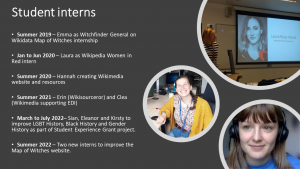
Wikimedia internships at the University of Edinburgh since 2019
16) More Wiki internships slide
Two more interns, Erin and Clea, improved the website in 2021 and focused on adding new sections on Wikimedia Commons, Wikidata, and WikiSource. Our new interns for this Summer 2022 will focus on expanding our work on the Map of Accused Witches site.
These internships were my way in to work more closely with our Careers Service and discussing trialling new ways to support students through also offering accreditation for the work they did outside the curriculum.
17) The Edinburgh Award slide
We know that many students are involved in activities alongside their studies such as volunteering, part-time work, and getting involved in the University community.
To help these activities to stand out from the crowd, our University has worked to pilot a new Award for “Digital Volunteering with Wikipedia” to sit beside other available Edinburgh Awards– the Edinburgh Award is a programme that allows students to get official recognition for their involvement in extracurricular activities and demonstrate their digital capabilities to employers.
18) Graduate Attribute slide
There are many different types of Edinburgh Award activity students can undertake but Digital Volunteering with Wikipedia focuses on developing 3 Graduate Attributes over the course of at least 50 hours of work and providing evidence of demonstrable learning, reflection and impact. The 50 hours are staggered over the December to May period punctuated by 3 main input sessions.
19) Three inputs slide
In the first, Aspiring, in December the students self -assess themselves against the Graduate Attributes and select three to develop as part of the award. They also select a topic area of Wikipedia they wish to improve and submit a 400 word action plan for how they plan to develop their chosen Graduate Attributes and how they’ll deliver impact.
20) Fortnightly Log slide
Once they have had training and researched their topic areas, the 2nd Input Session, Developing, at end of January requires them to re-assess if their Graduate Attribute ranking has changed, and submit a completed Fortnightly Log of Activities designed to evidence their work to date and their reflections on how they are progressing towards their personal project goals.
The final Input Session, Owning, is about coming together to share their project outcomes and reflections as well as ensuring the students get the opportunity to ties all this in with their future goals and how they will communicate about their Edinburgh Award experience to their peers, academic advisors or employers. This session will take place at end of May and their final submission will be an 800 word report or 3-5 minute video presentation.
21) Course level slide
Of the 23 student pilot group – the vast majority of applicants were female. Over 80%. Bucking the 10-15% of editors on Wikipedia normally.
They also tended to come from Undergraduate courses. 60%.
22) Course disciplines slide
Of the disciplines, History of Art and Physics backgrounds were well represented. Which I believe is owing to recent project work with these departments and a willingness of the School Secretary to alert interested student groups.
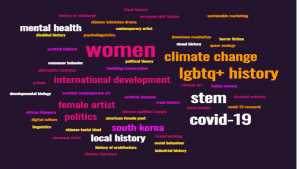
Topics suggested by students to improve online
23) Topics slide
More interestingly, are the topics the students wanted to write about. Climate change, Covid-19, LGBT History, Black History, Women artists, Women in STEM. Marginalised groups, underrepresented topics, some of the biggest and most pressing challenges in the world today. This shows me that students recognise and are intrinsically motivated by the importance of addressing knowledge gaps and improving the world around them.
24) The final 11
The initial 23 reduced to 11 by Input 3 but this was to be expected and is in line with other Edinburgh Award programmes similarly asking students to undergo 50 hours plus in extracurricular volunteering. 19,000 words have so far been added to Wikipedia and over 300 references to pages viewed almost 900,000 times. This is only a pilot of course and I have much I have to reflect on myself.
25) Reflections
Like how best to support students to ascertain what is Wikipedia missing when that task is seemingly endless, how to structure student time and support without losing elements of personalisation, choice and flexible working that they like, how best to engender a sense of a self-sustaining community and collaboration between students and between the students and hive mind expertise across the university and beyond, also how best to quantify and quality assure what counts as a significant body of work and impact on Wikipedia.
26) Conclusion
I have much I have learnt myself from this trial run and it is not over yet. But when turning on the news seems to reflect the darkest of times of late, I have found faith that students find this work meaningful and relevant for their studies, for their employability and for their personal development as both empowered online citizens and card-carrying members of the human race.
Their willingness to communicate their scholarship openly for the good of all and to be the change they want to see has real and I hope profound potential which can be enhanced and greatly expanded in future iterations. Encouraging an army of student volunteers to be ambitious, reach out, learn, collaborate, to delve deep into the libraries and archives, devouring knowledge, synthesising it, finding the gaps and the people willing and able to help fill them. Everything connects after all, or it should. We can uncover hidden histories, build on prior learning, illuminate the darkness and lift each other up.
27) Final slide
So my question for you – how can Wikimedia best support you and wiki link with your work? Because that’s what this work is all about.
